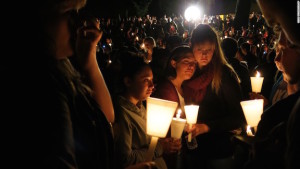I got a call this week from one of our university’s “public affairs” offices asking whether I would talk to a reporter from a local television station about the school shooting in Oregon.
“Why do they want a theologian?”
“Because the shooter may have been targeting people for being religious.”
Our school, like many others, wants faculty to do these interviews so our university’s name will appear on television and people will know that we exist. At other schools, they want faculty to do interviews so that they’ll look like “experts,” but anyone with that expectation will be sadly disappointed. News people will take no more than six seconds of anything you say for a story, usually the most banal, unenlightening six seconds they can find. An expert on voting patterns will sagely intone: “And so it’s important everyone vote.”
His grandmother could have said that. But they came out to campus, put up all their equipment, found a good camera angle, and filmed him making probably a half-dozen authentically intelligent comments so they could get six seconds of him saying something anyone could have said. That one sentence was probably the only thing the reporter wanted him to say all along. They should just get sophisticated ventriloquist dummies from the Disney corporation. It would save them time.
But we need the free advertisement, and I respect that, so I try to say yes when I can, and think of a good place to do the “interview” where the cameraman can get a flattering shot of the campus. I know they only want a sound bite, so when they show up, I tell the reporter: “I can say these two sentences; if you want either of them, then let’s film it and be done.” Usually they say: “Great,” because they don’t want to waste their time any more than I do, and they’ve got to get back to the station, do the editing, and file their report. They don’t care what I have to say, and I don’t care that they don’t care, as long as they get the name of the university right and film it (and me, to the extent this is possible) from a flattering angle.
So when this reporter showed up, I had a nice spot, and was ready for her to ask me all about this guy shooting religious people. I was ready to say that it was still early in the investigation; that we shouldn’t jump to conclusions; that people tend to jump on ideological bandwagons whenever these tragedies occur, and we should just be patient and let the facts come out; that at Columbine, one of the gunmen had asked a girl whether she was a Christian, and when she said yes, he shot her. But investigators hadn’t concluded that the entire shooting was owing to anti-Christian animus. I was going to tell her that, when crazy people do crazy things, drawing quick conclusions about their “reasons” – as though they weren’t crazy – is a category mistake.
In short, I was going to try to avoid jumping on an ideological bandwagon about secular people’s hatred of religious people both because there wasn’t sufficient evidence yet to support that conclusion and because I think it’s always dangerous to draw general conclusions from these tragic situations other than the obvious one that we’re obviously not dealing with disturbed individuals of this sort adequately. I assumed the reporter would find something relatively meaningless to edit out of all that – probably the last sentence about inadequate treatment, which is something pretty much anyone could have said.
But I was totally blind-sided when, after setting up, the reporter asked me: “So why does it seem that religion causes so much violence?”

Huh, wait, what? This guy was shooting people because they were religious, and she wanted to know why religion causes violence. That’s like asking: what about women seems to make them so often victims of rape?
A colleague of mine suggested I should have said: “Are you blaming the victim?” – a nice catch-phrase, I had to admit, but the reporter would have just cut it; as she would if I had said: “What makes secular people so intolerant and violence-prone?”
Instead, I told her that, although anything could be used for evil purposes, religion was no more a cause of violence than many other things, such as nationalism or xenophobia or various forms of utopianism.
“But no,” she kept insisting over and over, “don’t you think – can’t you think of ways that religion is especially a cause of violence?” I thought to myself: “I hope she’s not planning on going over to the local mosque and asking them these questions.” She wasn’t.
“Why is religion so divisive?” she wanted to know. I told her that Pope Francis had just addressed a joint session of Congress, and it didn’t seem especially “divisive.” In fact, the members seemed more irenic toward one another than they had been in years.
It’s clear this woman heard the words “violence” and “religion,” and the only way she could put them together was to assume that the one was the cause of the other.
In that spirit, consider the following pairs of terms:
Black people / Trouble
Foreigners / Danger
Women / Weaker, Less Capable
If anyone were automatically to connect the first term in the pair with the second, we’d know what to call that.
Ignorant bigotry.
Would that have made a suitable sound-bite, I wonder: “Excuse me, miss, but do you realize your question shows that you’re an ignorant bigot”?
In retrospect, it probably would have made sense to go with: “Are you blaming the victim?” and then made sure she was getting a nice shot of the campus rose bushes.















